The Brazilian telenovela Renascer is the renowned 9 PM soap opera, created by Benedito Ruy Barbosa and adapted by Bruno Luperi. It premieres on January 22, 2024.
Introduction: A Journey of Resilience and Renewal
The remake of “Renascer” premieres on Monday, January 22, bringing to life the story of a man without possessions, alone in the world, who plants his destiny at the foot of a jequitibá tree—the largest he had ever encountered. In the vast cocoa plantations, with the region’s lush nature as a witness, he is reborn and forges a pact that will accompany him throughout his life.
This is the saga of José Inocêncio (played by Humberto Carrão/Marcos Palmeira), an obstinate and fearless man, driven by the courage and desire to make something of himself. The original work by Benedito Ruy Barbosa, first aired in 1993 and a landmark in Brazilian television drama, remains timeless with its mysteries, dramas, loves, vengeance, and legends. Now, it returns with fresh perspectives through the adaptation by Bruno Luperi, Barbosa’s grandson, with artistic direction by Gustavo Fernández.
Bruno Luperi celebrates the project, stating:
“Renascer delves into a deeper Brazil with greater intensity. It’s an epic, timeless work that holds a special place in the hearts of viewers and in the history of television. Now we have the opportunity to bring it into the present day. Time writes with us, and values have been redefined over the past 30 years. This shapes how we approach and treat the narratives, and how we translate those scenes and dramas for today’s audience. Having this chance again is yet another gift that destiny has given me.”
For Gustavo Fernández, who reprises his partnership with Luperi in artistic direction, the opportunity to revive a classic is even more challenging. “It’s a great responsibility to remake the ‘novel of a lifetime’ for so many people. Ultimately, it’s a story about family relationships, conflicts, loves, losses of loved ones, and other themes. Benedito’s work is timeless drama,” he reflects.
“Renascer” is a novela reimagined by Bruno Luperi based on the work of Benedito Ruy Barbosa. The artistic direction is by Gustavo Fernández, with general direction by Pedro Peregrino and direction by Alexandre Macedo, Walter Carvalho, Ricardo França, and Mariana Betti. The production is by Betina Paulon and Bruna Ferreira, and the genre direction is by José Luiz Villamarim.
The Plot of “Renascer”
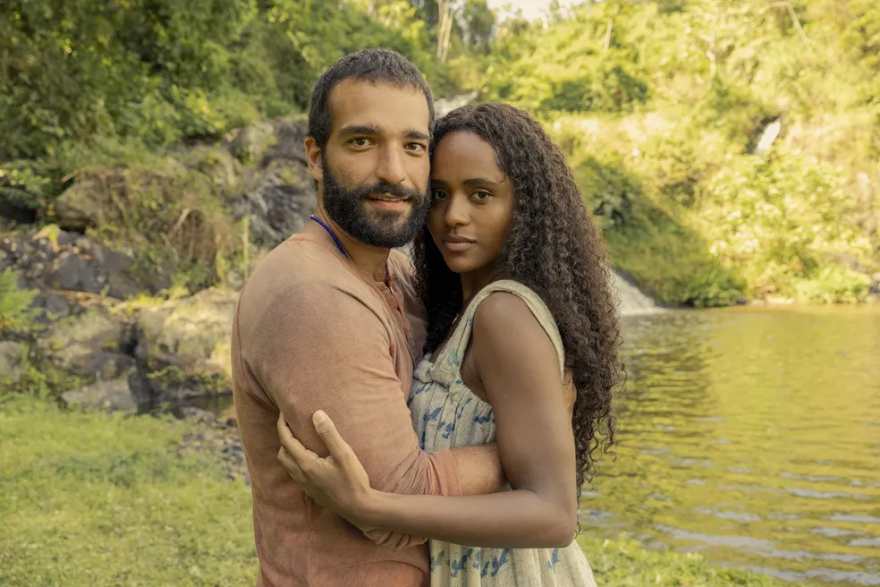
After making a pact with the jequitibá tree, José Inocêncio becomes a legendary figure, known as the most successful farmer in the region due to his accomplishments as a cocoa producer. While still young, he wins the heart of Maria Santa (Duda Santos).
Their passionate love results in four sons: José Augusto (Renan Monteiro), José Bento (Marcello Melo Jr), José Venâncio (Rodrigo Simas), and the youngest, João Pedro (Juan Paiva), who never gets to know his mother, as she dies giving birth to him. This tragedy enrages José Inocêncio, who blames João Pedro for the death of his beloved.
The relationship between father and son is marked by indifference and resentment throughout their lives. Adding to the past’s burdens, years later, the arrival of the mysterious Mariana (Theresa Fonseca) will challenge all these emotions when both José Inocêncio and João Pedro fall in love with her.
The First Phase
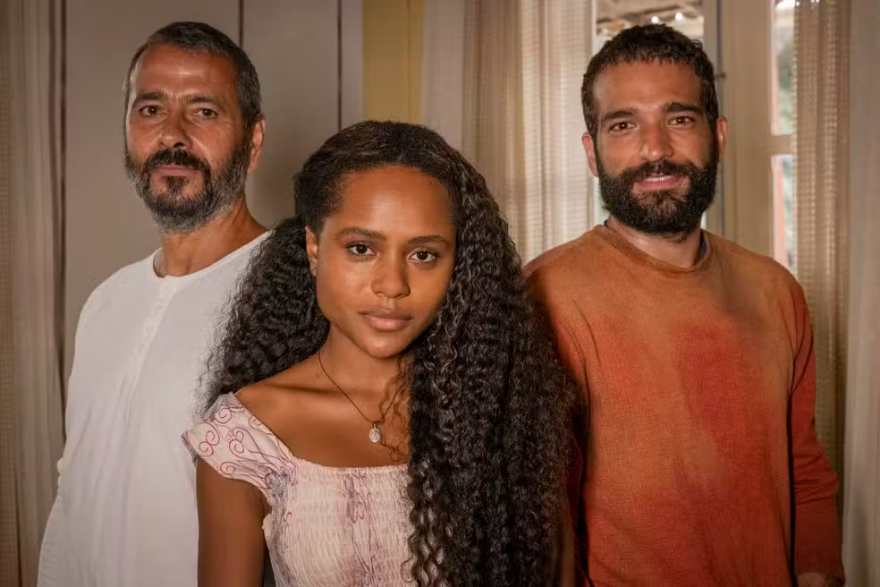
Upon encountering the “king” jequitibá tree, José Inocêncio plants his destiny with these words:
“While my machete is stuck at your feet, neither you nor I will die… neither by violent death… nor by natural death!”
The story begins in the early 1990s in the cocoa-growing region of Ilhéus, in southern Bahia. The allure of the tree, known as the “giant of the forest,” is so captivating that the wanderer fails to notice the approach of hired guns. Carrying no possessions but a glass bottle with a tiny devil inside, José Inocêncio is accused of being a land invader by the henchmen hired by Colonel Firmino (Enrique Diaz). As punishment, he is hung upside down from a tree and gradually flayed.
José Inocêncio is rescued by the sudden appearance of an angelic figure: the peddler Rachid (Gabriel Sater/Almir Sater), who saves the future “little colonel” from the first of many ambushes he will face in his journey. This episode not only leaves physical scars but also earns him the reputation of being a “man with a body impervious to death.”
Fortune rarely abandons José Inocêncio, and he encounters people who significantly impact his life. One such person is Cândida (Maria Fernanda Cândido), the widow of a local farmer. She discovers the severely injured young Inocêncio on her property without knowing his identity.
Their connection begins when Cândida sees the dire condition of the man on the brink of death and decides to help him. After regaining consciousness, Inocêncio proposes to take over her farm and restore its productivity. Skeptical but trusting her intuition, Cândida hands over the farm to José Inocêncio and leaves for an unknown destination.
Standing by Inocêncio’s side is Inácia (Edvana Carvalho), the farm’s cook, who will support him through joy and sorrow in the years to come. She also helps him avoid dangers with her premonitions.
José Inocêncio’s ability to win admirers and respect is another of his gifts. An example is Deocleciano (Adanilo/Jackson Antunes), his loyal right-hand man and confidant. As one of the first employees at the Jequitibá-Rei farm, Deocleciano helps Inocêncio build his empire during the early phase of the story.
Deocleciano, alongside his wife Morena (Uiliana Lima /Ana Cecilia Costa), becomes the godparent to João Pedro (Juan Paiva), the youngest son, who is neglected by José Inocêncio. The couple provides the boy with the love and care his father denies him.
However, José Inocêncio also has many enemies. Coveting Cândida’s former lands, local powerhouses Belarmino (Antonio Calloni) and Firmino (Enrique Diaz) are unwilling to share the cocoa market with the “outsider.” Belarmino, who amassed wealth during the golden age of cocoa, sees his fortune crumble with the spread of witch’s broom disease. His attempt to eliminate his rival through an ambush backfires in an unexpected way.
José Inocêncio’s masterstroke of acquiring Belarmino’s lands will have future repercussions when Belarmino’s granddaughter, Mariana (Theresa Fonseca), arrives to reclaim her family’s legacy.
As José Inocêncio begins establishing himself as a cocoa producer, possessing Cândida’s lands, he gains the respect and admiration of the locals. Love at first sight strikes when he meets Maria Santa (Duda Santos). Known as Santinha, she lives under the strict control of her father, Venâncio (Fabio Lago), Belarmino’s foreman, and the submissiveness of her mother, Quitéria (Belize Pombal).
Maria Santa falls deeply in love with José Inocêncio during a Bumba Meu Boi procession, a rare outing permitted by her father. Unfamiliar with relationships, she mistakenly believes she is pregnant after kissing Inocêncio. This misunderstanding leads to a dramatic turn of events when her parents abandon her at the doorstep of a brothel owned by Jacutinga (Juliana Paes).

Jacutinga becomes a second mother to Maria Santa, protecting and guiding her. She also acts as a matchmaker, facilitating the marriage between Maria Santa and José Inocêncio at her own home, blessed by Padre Santo (Chico Diaz). A wise woman, Jacutinga plays a crucial role in the formation of this family and assists in the birth of their four sons: José Augusto (Renan Monteiro), José Bento (Marcello Melo Jr), José Venâncio (Rodrigo Simas), and the youngest, João Pedro (Juan Paiva).
The Second Phase
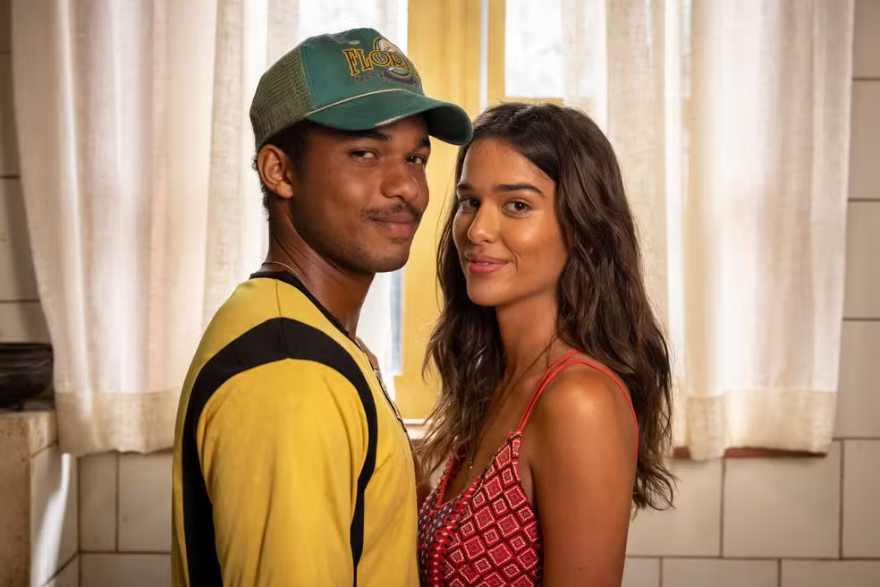
Years have passed. Thirty-five years after the young José Inocêncio (Humberto Carrão) struck his machete at the foot of the Jequitibá Rei tree, the now successful farmer José Inocêncio (Marcos Palmeira) has prospered in business but stagnated in his personal life. Since the death of Maria Santa (Duda Santos) during the birth of João Pedro (Juan Paiva), he has shut himself off from life and has long forgotten the joy of living.
On the farm, José Inocêncio keeps himself busy with work in the fields and invests in agroforestry through the cabruca system to produce sustainable cocoa. He relies on the support of Deocleciano (Jackson Antunes) for the farm work and the loyalty of Inácia (Edvana Carvalho) at home.
Among his four sons, the youngest, João Pedro, is the only one who never left the farm and lacks professional education. The others moved to the city to study and became “doctors” with their father’s financial support. Zé Augusto is a doctor, Zé Bento a lawyer, and Zé Venâncio a publicist.
However, João Pedro has not wasted his talent, channeling his energy into cocoa production. He knows the land well and has inherited his father’s skill in handling the crop, which he does competently—perhaps the only connection between father and son. Both José Inocêncio and João Pedro harbor deep-seated resentments and wounds that never healed. The trauma of Maria Santa’s death still profoundly affects the farmer, who continues to blame his youngest son for his great love’s demise.
Despite this, João Pedro feels immense pride in his father and lives to please him, hoping for any semblance of attention. His only desire is to earn his father’s love. Growing up under the shadow of being blamed for his father’s greatest sorrow was not easy.
The situation begins to change when João Pedro meets Mariana (Theresa Fonseca), a mysterious young woman newly arrived at Jacutinga’s (Juliana Paes) house. He is immediately captivated by her beauty and charm and soon proposes that she move to his father’s farm, which she eagerly accepts.
Mariana is the granddaughter of Colonel Belarmino (Antonio Calloni) and Dona Nena (Quitéria Kelly), who raised her with the bitterness of losing their family’s land to José Inocêncio. Mariana’s arrival at the Jequitibá Rei farm sparks a new conflict between father and son, as both fall in love with her. Cleverly, Mariana seduces José Inocêncio, who decides to marry her, surprising everyone and deeply saddening João Pedro.
Mariana’s presence profoundly affects the daily life at the Jequitibá Rei farm and impacts many characters. However, her true intentions as Belarmino’s granddaughter remain unclear. What is evident is that nothing will ever be the same, especially for José Inocêncio.
Concerned about the future, the farmer’s older sons decide to reconnect with their father and return to Ilhéus. Zé Augusto (Renan Monteiro), newly separated, faces professional challenges with the threat of losing his medical license. Zé Bento (Marcello Melo Jr) struggles with accumulated debts and is far from being a successful lawyer. In addition to relying on his father’s support, he is financially dependent on his girlfriend, Kika (Juliane Araujo), who is also a lawyer.
Among the brothers, Zé Venâncio (Rodrigo Simas), the third in line for succession, has made the best use of his opportunities. As a partner in an advertising agency, he has an established career. However, his personal life is in crisis. His marriage to Eliana (Sophie Charlotte) is plagued by constant arguments, jealousy, and infidelity. The relationship seems doomed, especially when Zé Venâncio falls for Buba (Gabriela Medeiros), a successful woman who dreams of starting a family.
While Mariana’s presence is new to the Inocêncio family, the rivalry with Colonel Egídio Coutinho (Vladimir Brichta) spans generations. Egídio, the only son of Firmino (Enrique Diaz), inherited not only the cocoa plantations but also his father’s knack for negotiating other farmers’ productions.
Colonel Egídio lives with his wife, Iolanda, known as Dona Patroa (Camila Morgado). Despite her submissiveness and fear of her husband, she knows his true nature well, suffering from his harshness and infidelity.
Tião Galinha
A dreamer seeking a piece of land to call his own and the chance to live with dignity, Tião Galinha (Irandhir Santos) arrives in town. He and his wife Joana (Alice Carvalho) try to start anew in the cocoa zone of Ilhéus. They meet Father Santo (Chico Diaz) and Pastor Lívio (Breno da Matta), who help the family and get them jobs at Colonel Egídio Coutinho’s farm.
Tião soon hears of José Inocêncio’s fame and becomes captivated by the legend that the colonel has the protection of a little devil in a bottle, which not only “closes his body to death” but also helped him become rich through cocoa production. Obsessed with creating his own little devil, Tião seeks advice from José Inocêncio, leading to unexpected and often humorous results. Despite becoming the town’s laughingstock, Tião remains determined to achieve his dreams.
The Scenic Locations of Ilhéus: Natural Beauty and Sustainable Cocoa Cultivation
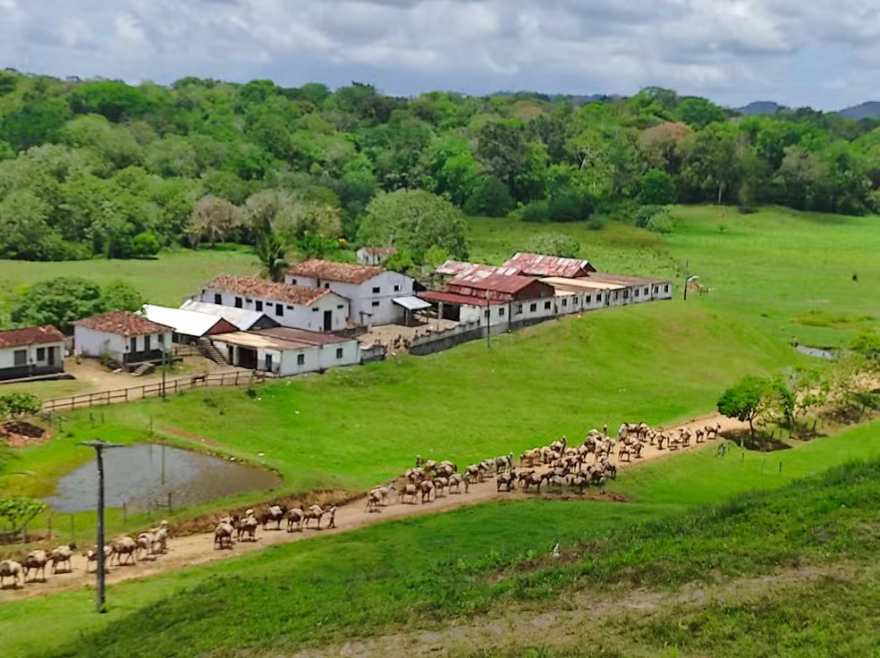
The city of Ilhéus in southern Bahia, where the central story of the soap opera unfolds, was chosen as the filming location starting in October 2023. A team of 200 professionals, including cast, crew, and local workers, assisted in shooting scenes in Ilhéus’ historic center, such as the traditional Vesúvio restaurant and the Jorge Amado Cultural House. These scenes feature Marcos Palmeira and Theresa Fonseca and appear in both phases of the soap opera.
Cocoa farms in the region served as the backdrop for many scenes, featuring actors Humberto Carrão, Duda Santos, Adanilo, Evaldo Macarrão, Antonio Calloni, and Enrique Diaz, who play characters from the first phase, as well as Edvana Carvalho, who appears in both phases.
The Enchanted Lagoon, with its large 15 km² water mirror, and the region’s waterfalls, such as the “Veil of the Bride,” helped tell the story of young José Inocêncio (Humberto Carrão) and his companions Deocleciano (Adanilo) and Jupará (Evaldo Macarrão) as they transported cocoa sacks on 1990s boats.
In Uruçuca, Ilhéus, scenes were filmed on José Inocêncio’s (Marcos Palmeira) plantations for the second phase, featuring actors Juan Paiva, Theresa Fonseca, Jackson Antunes, Samantha Jones, Xamã, Marcello Melo Jr, and Rodrigo Simas. These sequences were shot at a location using the cabruca system and agroforestry system (SAF) for cocoa production, involving different plant species in the same area, contributing to the environment.
Thus, the cocoa trees grow in the shade of other species, resulting in higher quality production and harvest. Unlike the original version, the soap opera will showcase new cocoa management techniques, focusing on land and environmental care and producing more refined cocoa products.
*Cabruca is a technique of managing and planting cocoa under the shade of native Atlantic Forest trees, surrounded by various species, preserving the region’s fauna and flora. This term will be frequently mentioned by the characters in this universe throughout the storyline.
Soundtracks
The soundtrack of “Renascer” embodies Brazilian musicality, starting with the classic “Lua Soberana” as the theme song. Originally a hit during the novela’s first airing in 1993, the song now returns in a revamped version performed by the powerful voices of Bahia’s own Luedji Luna and Xênia França, the latter of whom won the Latin Grammy for Best Portuguese Language Contemporary Pop Album in 2023.
“It is a great honor to perform this song, which is part of the collective memory, and to sing alongside Luedji makes it even more special. This song is ingrained in Salvador’s cultural fabric, and as Bahian singers, it holds significant symbolism,” says Xênia. “I am very happy to sing the opening theme of this novela, a classic of Brazilian TV. Even happier to do it with such an outstanding artist from my homeland: Xênia França! It will be historic!” adds Luedji.
Baian composers and performers lead the selection of original songs and re-recordings, including Maria Bethânia’s partnership with Almério in the new track “Quero Você,” Caetano Veloso’s rendition of “Trem das Cores,” and Gilberto Gil’s “Toda Menina Baiana.”
The Northeast is further represented by artists such as Fagner, Chico César, Elba Ramalho, Geraldo Azevedo, Xangai, and Quinteto Paraíba. The soundtrack also features icons like Milton Nascimento and collaborations like Ney Matogrosso with Criolo on “Algorítimo Íntimo.”
Emerging stars of Brazilian popular music bring additional Brazilianness to the novela with their songs. Agnes Nunes and Neo Beats, Juliana Linhares, Maria Maud, Gilsons, Rachel Reis, and Mulu join renowned names such as IZA, Alice Caymmi, Monica Salmaso, and Dori Caymmi, creating a rich mix of rhythms and styles from across Brazil. The musical production of “Renascer” is led by Victor Pozas, Rafael Langoni, and Rafael Luperi.

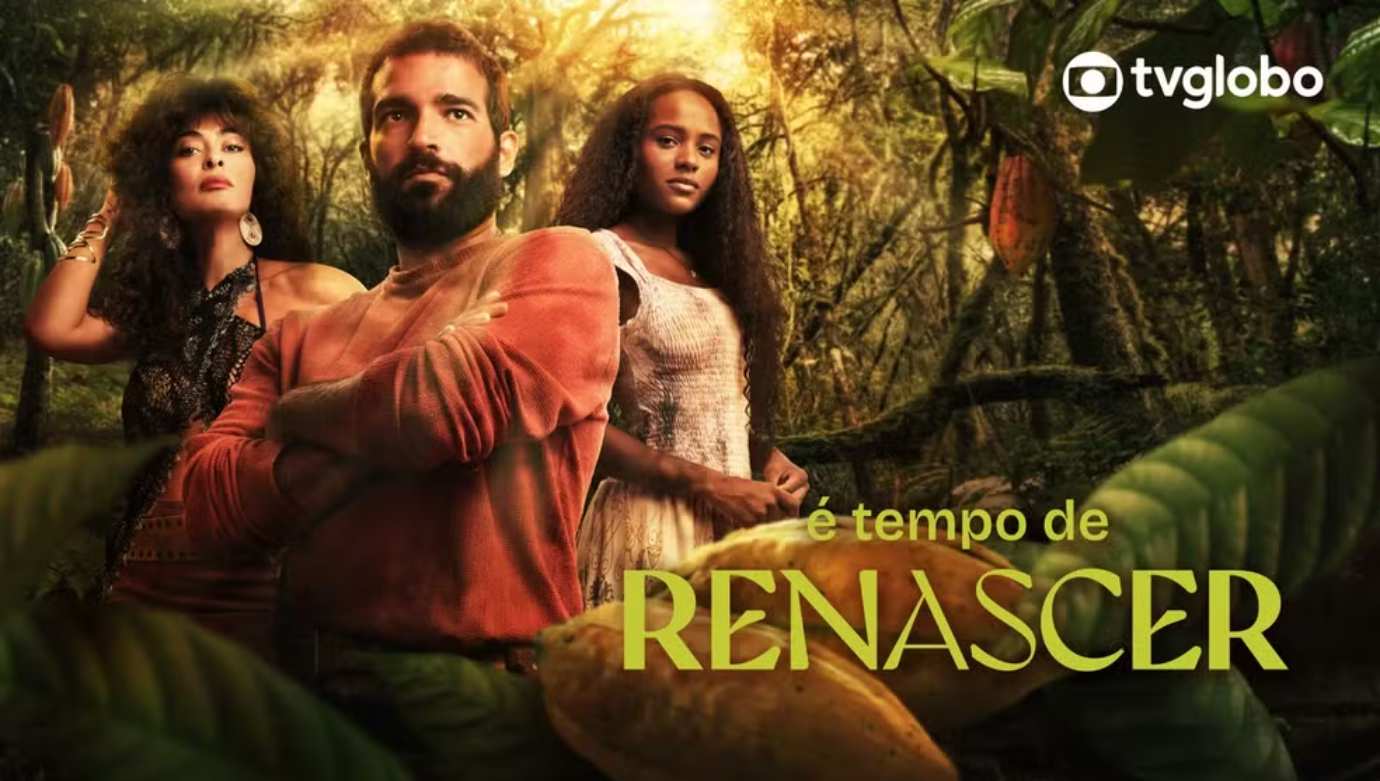
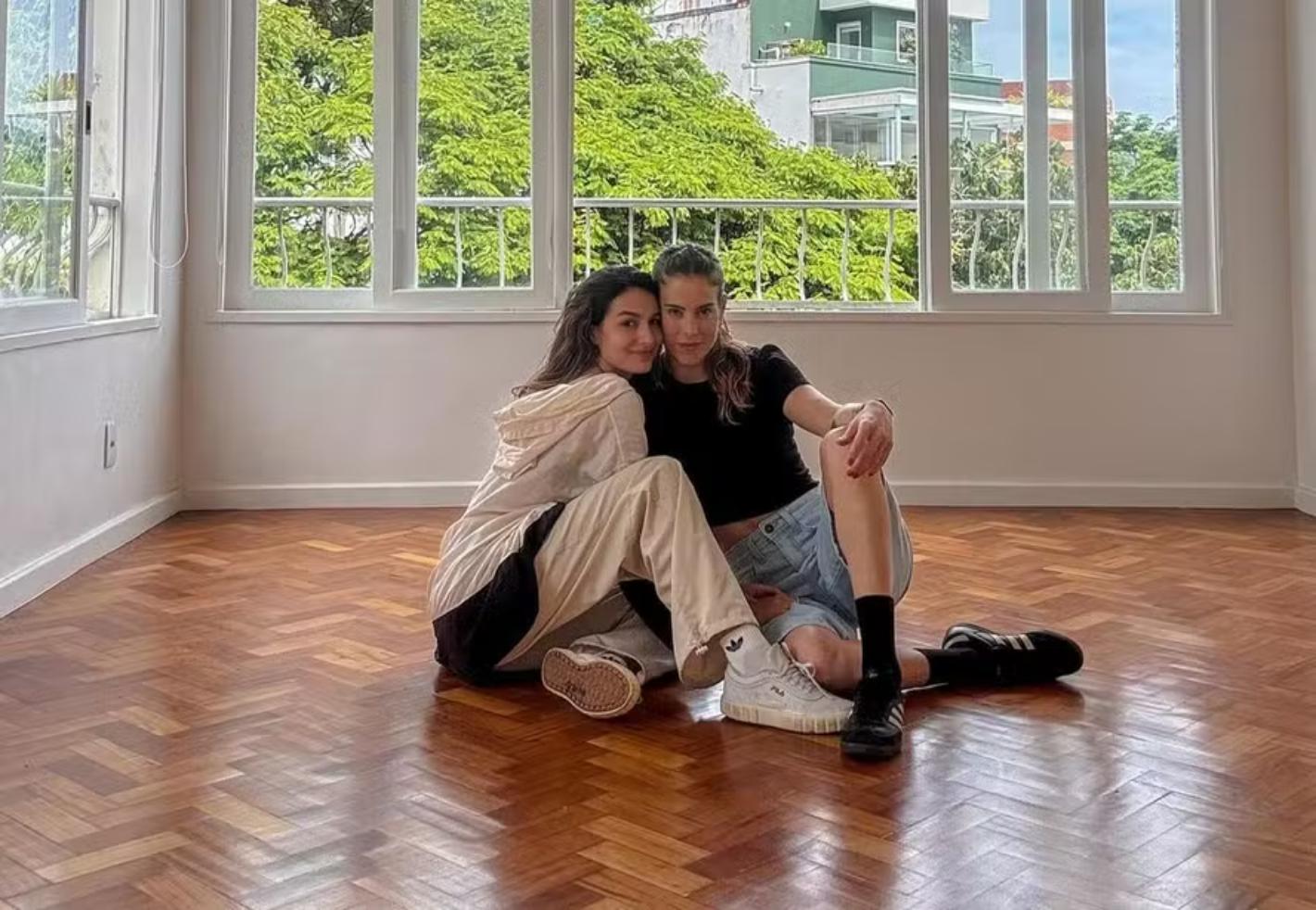



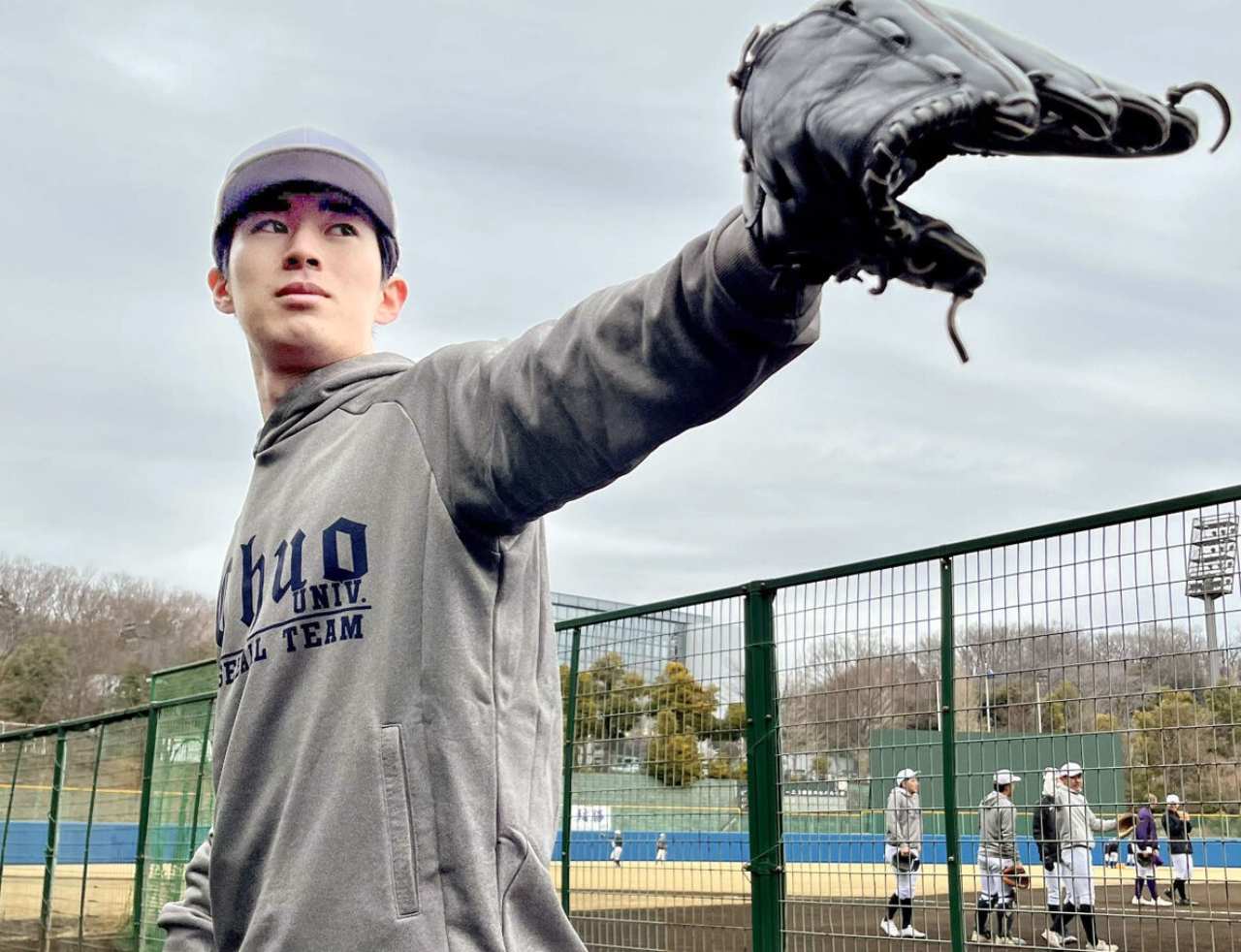
Leave a Reply Cancel reply